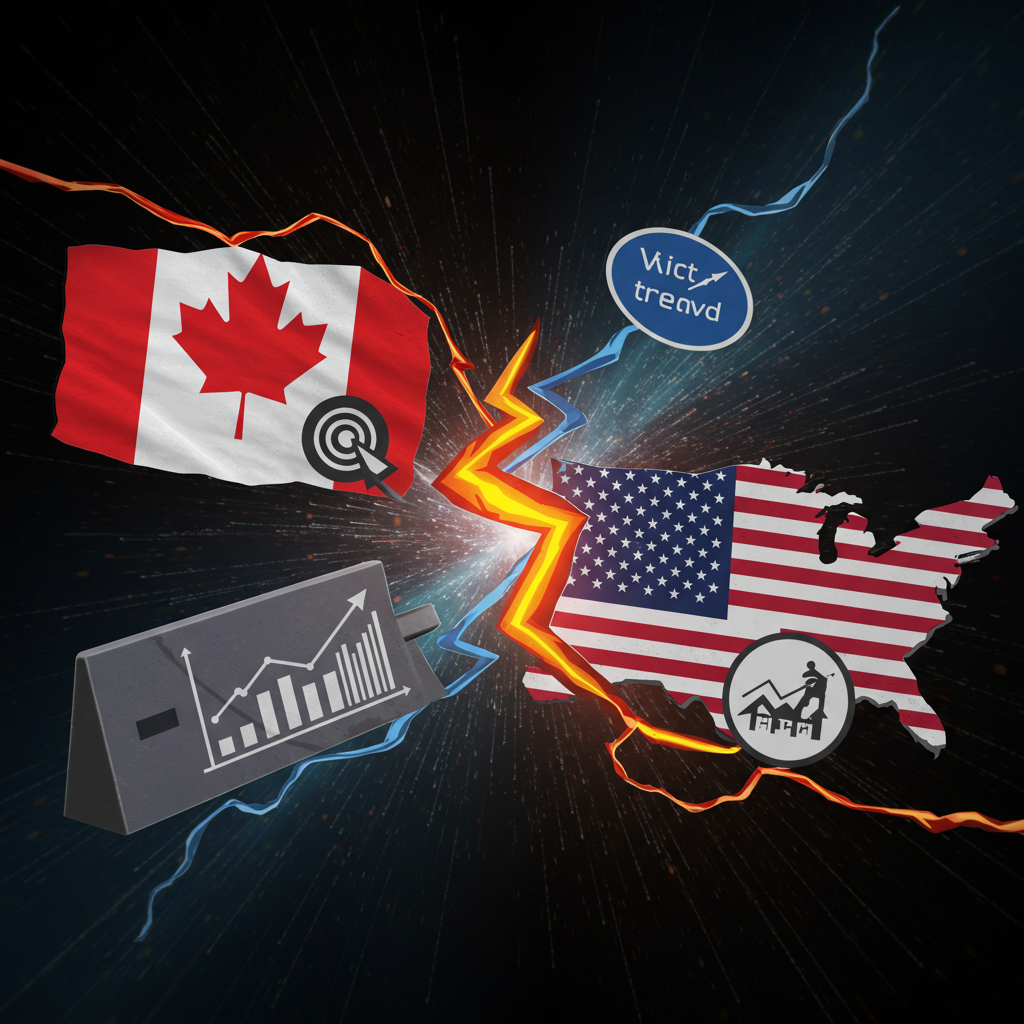Unpredictable trade policies between the United States and Canada have plunged many canadian businesses into a state of paralyzing uncertainty. As shifting US tariffs continue to create a volatile economic landscape, companies across Canada are desperately seeking stable, predictable rules to navigate cross-border trade. This lack of clarity makes long-term planning incredibly difficult and costly, particularly for small and medium-sized enterprises reliant on access to the vast US market.
The High Cost of Uncertainty for Canadian Businesses
For businesses like Taurus Craco, located near Toronto, dealing with sudden tariff changes has become a costly nightmare. This firm imports machinery from overseas and distributes it throughout North America, with a significant portion heading south to the United States. Owner Wes Love vividly illustrates the problem. His business was recently hit with a nearly C$35,000 penalty simply because a shipment destined for the US crossed the border minutes after a specific deadline related to a new tariff. This unexpected charge felt particularly punitive.
Mr. Love explained the financial impact. “That’s more than the cost that we spend on hydro and gas for the entire year,” he told reporters. Even though the tariff was paused just hours after his shipment crossed, Taurus Craco was still forced to pay the penalty. Refusing would have jeopardized their ability to continue shipping products into the US market altogether. Love likened the experience to “dealing with the mob,” highlighting the arbitrary and intimidating nature of the situation. For small business owners like him, this unpredictability is devastating. As he puts it plainly, “indecision is killer.” Without knowing the rules of the game, businesses cannot plan, invest, or grow effectively.
Why Stability Matters for Trade
Businesses need clear, consistent regulations to operate efficiently. Wes Love compared the situation to a sports game. “Give us a set of rules and leave them alone and let us operate within those rules,” he urged. “Everybody goes onto the field and you play to a set of rules, but you don’t change the rules in the middle of the game.” Constant changes to trade policies create immense risk and deter investment. Companies delay major decisions. They become hesitant to hire or expand. The focus shifts from growth to survival. This defensive posture slows economic activity across the board.
The Political Tug-of-War Over Tariffs
The uncertainty stems from an ongoing tit-for-tat trade dispute between Canada and its largest trading partner. Since taking office, US President Donald Trump has implemented a series of import taxes on goods from various countries. His stated goal is to boost American manufacturing and protect domestic jobs by addressing perceived trade imbalances and unfair foreign practices. These US actions have primarily targeted Canadian exports like steel, aluminum, and vehicles, sparking retaliatory tariffs from Ottawa.
The political relationship has seen shifts. Canadian Prime Minister Mark Carney initially called Trump’s tariffs “unjust.” He suggested the “old relationship” with the US was “over” during election campaigning. However, after winning the election, he adopted a more conciliatory approach. Prime Minister Carney visited Washington D.C. to initiate discussions on a new trade and security agreement. Negotiators even set a July 16th deadline to work out a deal. At a recent G7 summit, President Trump expressed optimism about resolving trade issues with Canada.
Talks Collapse Over Digital Tax
Despite hopes for progress, trade talks hit a significant snag. On a recent Friday, President Trump announced an immediate halt to all trade discussions with Canada. He explicitly cited Canada’s digital services tax as the reason. “We are hereby terminating ALL discussions on Trade with Canada, effective immediately,” he declared on social media. This 3% levy, enacted by Canada on large tech companies (mostly US firms) with significant revenue from Canadian users, has been a major point of contention. US officials view it as discriminatory.
Canadian officials had reportedly anticipated that the digital services tax issue would be addressed within the context of the broader trade negotiations. The US has also voiced similar concerns about digital taxes in other countries, including the UK and Turkey, viewing them as unfairly targeting US tech giants. Following Trump’s announcement, Prime Minister Carney reportedly threatened another round of retaliatory tariffs on the US if negotiations failed. This unpredictable political back-and-forth directly fuels the instability frustrating Canadian businesses.
Broader Economic Repercussions
The trade war and the resulting uncertainty have had a tangible impact on Canada’s economy. Canada relies heavily on trade with the US. According to Statistics Canada, a remarkable 75% of all Canadian exports head south of the border. This interdependence means friction significantly affects economic performance. The Canadian Federation of Independent Business (CFIB) reported a significant slowdown in Canada’s economy during the first quarter of 2025. Growth was a mere 0.8% between January 1st and March 31st. The economy even shrank slightly in April, contracting by 0.1% over the month.
Business representatives confirm the difficult environment. Gaphel Kongtsa, international policy director at the Canadian Chamber of Commerce, noted that firms are hopeful for stability. However, they have had to navigate a “very fluid landscape” thus far. Tariff changes seem to occur without clear warning or rationale. This lack of transparency compounds the challenge for planning. Beyond national data, the impact is felt acutely in border communities. Towns like Port Huron, Michigan, and Sarnia, Ontario, rely heavily on cross-border traffic. Data shows a decline in Canadian visits to the US since the tariffs began. CBP data indicates border crossings between the two countries are down around 17%. Statistics Canada reported an even steeper drop in Canadian car trips to the US, down almost 32% compared to figures from March 2024. Local businesses, from restaurants to duty-free stores, have seen sales plummet, suffering significant “collateral damage” from federal policies.
The Unseen Impact on the Service Sector
While manufacturing often takes center stage in discussions about tariffs and trade wars due to direct levies on goods, the service sector also suffers significantly from the prevailing uncertainty. Sam Gupta, founder and CEO of ElevatIQ, a technology and management consultancy operating in both Buffalo, New York, and Toronto, describes the service sector as the “unloved stepchild” of the economy during such times. Attention tends to focus on manufacturing and supply chain disruptions.
Yet, services form a massive part of Canada’s economy, employing the vast majority of its workforce and encompassing fields from finance to tourism. While service exporters may not face direct tariffs, market confidence and outlook have sunk to multi-year lows. Unlike the manufacturing sector, which has received some government relief measures funded partly by counter-tariffs, the service sector has received no compensation. “We are not even in the conversation,” Mr. Gupta stated, feeling invisible to policymakers. His own business inquiries were down by 50%. Businesses are delaying long-term investments due to the unpredictable duration of the crisis. Gupta worries about survival if the uncertainty lasts for two or three years, calling it the toughest period in his 20-year career.
Business Strategies for Survival
Canadian businesses are not simply waiting for the situation to resolve. Statistics Canada reports that 56% of businesses exporting to the US have implemented measures to mitigate the impact of tariffs. These actions include delaying major investments and expenditures (taken by over 30% of firms) and actively seeking alternative customers outside the US market (pursued by 25%). Official data reflects the difficulty. The Bank of Canada reported significant drops in exports to the US in April. Overall exports fell by over 15%. Steel and aluminum exports were down by 25% and 11% respectively, while vehicle exports declined by 25%.
Despite the substantial challenges, a spirit of resilience remains among many Canadian entrepreneurs. Wes Love, for instance, maintains a positive outlook. He believes businesses can navigate the difficulties if the US trade policy stabilizes. Canadian entrepreneurs are known for their tenacity. “We are full of piss and vinegar, as they would say,” Love remarked. They are actively working to keep fighting. The core requirement for their success, he emphasizes, is simply knowing the “ground rules” and having confidence they won’t change constantly.
Frequently Asked Questions
Why is the uncertainty around US tariffs so harmful for Canadian businesses?
The constant shifts in US tariff policy make it nearly impossible for Canadian businesses, especially small ones, to plan effectively. They face unexpected costs, delays, and risks that disrupt supply chains and budgeting. Businesses delay investments and expenditures (over 30% are doing this), and fear that prolonged uncertainty (potentially 2-3 years) could threaten their survival. Companies need predictable rules to operate and grow, which the current volatile environment lacks.
What measures have Canadian businesses taken to cope with the US trade situation?
Many Canadian companies are actively mitigating the impact of the trade war. According to Statistics Canada, 56% of firms exporting to the US have taken action. Common strategies include delaying major investments (over 30% of businesses) and seeking out new markets and customers outside of the United States (25% of businesses). Despite these efforts, exports to the US have still seen significant declines in key sectors like steel, aluminum, and vehicles.
Has the Canadian government provided support to businesses affected by US tariffs?
Yes, Ottawa has implemented some measures intended to provide relief to companies impacted by US tariffs. These measures have included utilizing funds raised from Canada’s own retaliatory counter-tariffs. However, this support has not been uniform across all sectors. The service sector, despite suffering from the indirect effects of trade uncertainty (like decreased confidence and inquiries), has reportedly not received any compensation, feeling excluded from the government’s relief efforts.
The overriding message from Canadian businesses remains clear. They are resilient and determined, but the current climate of unpredictable US trade policy creates immense hurdles. The path forward requires stability, clear rules, and a commitment from both nations to predictable trade relations. Without certainty, the negative economic impacts on Canadian firms will continue to mount.




